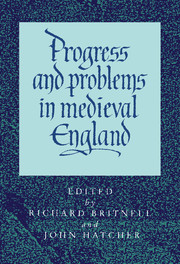Book contents
- Frontmatter
- Contents
- List of figures
- List of maps
- List of tables
- List of contributors
- Edward Miller: an appreciation
- List of abbreviations
- 1 Economic development in the early twelfth century
- 2 Lothian and beyond: the economy of the ‘English empire’ of David I
- 3 Boroughs, markets and trade in northern England, 1000–1216
- 4 Peasant deer poachers in the medieval forest
- 5 The growth of London in the medieval English economy
- 6 The bankruptcy of the Scali of Florence in England, 1326–1328
- 7 The English export trade in cloth in the fourteenth century
- 8 A medieval tax haven: Berwick upon Tweed and the English crown: 1333–1461
- 9 Taxation and communities in late medieval England
- 10 Peasants and the collapse of the manorial economy on some Ramsey Abbey estates
- 11 The famuli in the later Middle Ages
- 12 The great slump of the mid-fifteenth century
- 13 Lorenzo de' Medici's London branch
- 14 The trade of late medieval Chester, 1500–1550
- Bibliography of Edward Miller's published works
13 - Lorenzo de' Medici's London branch
Published online by Cambridge University Press: 05 June 2012
- Frontmatter
- Contents
- List of figures
- List of maps
- List of tables
- List of contributors
- Edward Miller: an appreciation
- List of abbreviations
- 1 Economic development in the early twelfth century
- 2 Lothian and beyond: the economy of the ‘English empire’ of David I
- 3 Boroughs, markets and trade in northern England, 1000–1216
- 4 Peasant deer poachers in the medieval forest
- 5 The growth of London in the medieval English economy
- 6 The bankruptcy of the Scali of Florence in England, 1326–1328
- 7 The English export trade in cloth in the fourteenth century
- 8 A medieval tax haven: Berwick upon Tweed and the English crown: 1333–1461
- 9 Taxation and communities in late medieval England
- 10 Peasants and the collapse of the manorial economy on some Ramsey Abbey estates
- 11 The famuli in the later Middle Ages
- 12 The great slump of the mid-fifteenth century
- 13 Lorenzo de' Medici's London branch
- 14 The trade of late medieval Chester, 1500–1550
- Bibliography of Edward Miller's published works
Summary
Why did the Medici bank go downhill under the management of Lorenzo de' Medici, 1469 to 1492? The present article is about one section only, the London branch, but it may have some usefulness for illuminating the general problem. Since Lorenzo's servants were deeply involved in the trade and politics of London it may also shed some light on English history. The Medici bank was very fully and helpfully investigated by Raymond de Roover. De Roover quoted the general judgements of Machiavelli and Guicciardini that Lorenzo had no commercial luck and stood aside from the business of the bank, leaving it to his representatives. In the case of the English branch he attributed much importance to independent loans to King Edward IV parallel to the Bruges branch's loans to Charles the Bold duke of Burgundy. De Roover made a good deal of progress but his account is not final. There is a vast amount of documentary material relevant to the London branch in the Mediceo avanti il Principato collection in the Archivio di Stato, Florence, and in the exchequer records at the Public Record Office in London. De Roover did not use any of the unpublished London material, and did not refer to many of the relevant records in Florence. This article will not be final either – the Medici bank is an endlessly complicated subject with ramifications in so many areas of European history – but I hope to push a little further into the complex web of evidence and make the conclusions a little stronger.
- Type
- Chapter
- Information
- Progress and Problems in Medieval EnglandEssays in Honour of Edward Miller, pp. 273 - 285Publisher: Cambridge University PressPrint publication year: 1996
- 2
- Cited by

